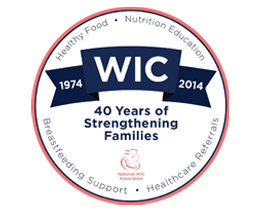 While many service programs are currently experiencing funding shortages and budget cuts, one veteran public health program is turning 40 with room to grow. The Nutrition Program for Women, Infants and Children, more commonly known as WIC, is celebrating its 40th anniversary this year.
While many service programs are currently experiencing funding shortages and budget cuts, one veteran public health program is turning 40 with room to grow. The Nutrition Program for Women, Infants and Children, more commonly known as WIC, is celebrating its 40th anniversary this year.
In Wenatchee and Chelan, the state-funded WIC program is managed by Columbia Valley Community Health (CVCH) and serves both working and unemployed families. More than just a supplement food assistance program, WIC provides nutrition education, breastfeeding promotion and support and health care referrals.
“It’s this unique combination of services that has made WIC such a sustainable and successful program,” says Jody Ceesay, CVCH WIC Supervisor. “WIC is one of our country’s most important public nutrition programs – one with a proven track record of improving healthy pregnancies and birth outcomes, reducing infant mortality, and preparing kids to be ready to learn, all of which are positive investments.”
WIC is for low-income women who are pregnant, breastfeeding, or non-breastfeeding postpartum, infants and children up to age five. Ceesay says it’s the term “low income” that often misleads qualified candidates from applying to the program.
“People are often surprised to learn who qualifies for WIC. Over 67% of WIC clients are from working families. A family of four with can have an income up to $3,631 a month - that’s one parent working full time at $19 an hour.” Ceesay says that WIC’s focus on nutrition education and the long-term health of their families is what makes WIC different from other service programs.
“WIC is so much more than a food check hand out. It provides a variety of nutrition education topics such as “Quick and healthy meals for busy families”, or “Feeding children with food allergies”. It provides age-appropriate foods to promote healthy development for growing children, improves the likelihood of a healthy pregnancy and a healthy birth, and improves healthy eating behaviors and breastfeeding rates in a population at risk for nutrition-related illness.”
Studies have shown that every dollar spent on WIC saves $4 in medical bills over time. Lack of access to good nutrition and bad eating habits can contribute to costly pregnancy complications, like pre-term and low-birth weight births. “By empowering the most vulnerable in our communities with access to good nutrition, we are increasing the likelihood of good long-term health, something that pays for itself many times over,” Ceesay says.
WIC is also good for local grocers, retailers and farmers markets. In Chelan and Douglas counties, $2,875,091 in food dollars went into the local economy in 2011 from WIC checks. But if WIC is such a beneficial program, and times are so tough, why isn’t the program filled to capacity?
“We don’t know the answer, but have some ideas,” explains Ceesay. “Many families may not be aware that the program exists, especially if this is their first time needing help. But a bigger reason seems to be misconceptions about who qualifies. Most people think it’s a food stamp program for pregnant women or that working families aren’t eligible. But our program funding is available for families who qualify and in these tough times, we want to serve every mother and child we can.”
Research from the National WIC Association shows that promoting healthy eating habits early in children, and during a woman’s pregnancy, is a cost effective way to improve lifelong health. When children get a good start, they are more likely to enter school ready to learn and grow up to be healthy adults.
“The program helps young families whose budgets are often tight,” Ceesay says. “Often, our client’s financial situations improve and they no longer need the help. But they say they are glad we were there when they needed us. That’s the great thing about this program. Clients can stop at any time or when their income goes up, and can always re-enroll when times get tough.”
About WIC
WIC is a national supplemental nutrition program funded by the United States Department of Agriculture. In Washington State, WIC is operated by the Washington State Department of Health, and reaches over 195,000 women, infants, and children in 205 clinics each month, providing services to over 315,000 individuals in the state each year.
About CVCH WIC
CVCH WIC offices are located at 600 Orondo Ave. in Wenatchee and at 105 South Apple Blossom Drive in Chelan. There is also a WIC office at the Chelan-Douglas Health District located at 200 Valley Mall Pkwy, East Wenatchee, WA 98802. To learn more about WIC and its eligibility guidelines, call Rosaura Gutierrez at (509) 664-3771.

